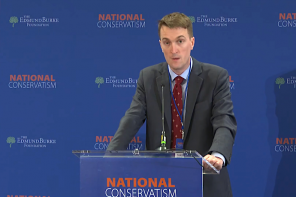In case it’s not obvious, Peter Thiel—the billionaire tech investor who secretly bankrolled Hulk Hogan’s sextape lawsuit against Gawker Media—takes his Christian faith seriously.
Christianity is “the prism with which I look at the whole world,” Thiel told a gathering hosted by the Newbigin House of Studies last year. The PayPal co-founder, who was raised evangelical, has participated in dialogues about Christianity and technology with Biblical scholar N.T. Wright and New York Times columnist Ross Douthat. He has written about Eden for the conservative Christian journal First Things, and he framed an essay in the National Review with a passage from Revelation.
This is all a bit unusual for an openly gay libertarian billionaire in Silicon Valley. Plus, it’s striking to hear such earnest theological reflection from the leading candidate for America’s Next Montgomery Burns—a title Thiel unofficially assumed last month, when the Hogan/Gawker allegations broke. (Exhibit A: He’s a Trump delegate. Exhibit B: He implied in an essay that women’s suffrage damaged the country. Exhibit C: He anonymously bankrolled that $140 million lawsuit, seemingly in order crush journalistic enemies.)
In coverage of the Hulk Hogan business, Thiel’s Christianity has mostly been a bemused sidenote. But Thiel’s statements about faith illustrate the way that techno-utopianism can mingle with Christian ideas—and even cast moguls in the roles of prophets.
Thiel draws parallels between Christian and technological worldviews through two avenues: the language of progress, and the language of victimhood.
The progress part is better evidenced. Asked at a Veritas Forum event about the commonalities between Christianity and technology, Thiel explained:
One very important commonality is that both have this view that the future will look very different from the past. This is certainly the view that is presented in science fiction, presented in the New Jerusalem: you’re not going back to the Garden of Eden.
And he expanded on the point at a later Veritas Forum dialogue, :
I think one thing that both a Christian and a scientific/technological worldview have in common is that they believe that there is—that every moment in history happens only once, that there’s a definite progress to history… I think having the structure, the future being different from the present, is always very important.
Thiel is not the first person to note the Christian overtones in a lot of tech-utopian ideas. Silicon Valley’s rhetoric of universal progress, gradual disembodiment, and even triumph over death all seem to echo Christian themes. But it’s rare for a tech insider like Thiel to examine the connection in such explicit terms.
Then there’s the victimhood. At the Newbigin House event, when asked “What does it mean when you say you are a Christian?” Thiel began talking about what he called “the truth of the victim.”
“The truth of Christ as against the persecuted community, that is the truth of our world,” he continued. “And there are so many sort of different contexts where I think that unfolds.”
What’s striking is the victim group that Thiel then identified: college students. Thiel has been a vocal critic of academia (he has compared its elite to the Catholic Church before the Reformation), and his Thiel Fellowship aims to help young entrepreneurs launch careers, provided that they drop out of school.
The implication here, which will resonate with readers of Ayn Rand, is that of a community of true makers wrapped up in an oppressive system. In a different talk, Thiel broadened his definition of the persecuted group to include the entire tech world: “Christians like to complain that [society] is vaguely anti-Christian in different ways,” he told a Veritas Forum event in 2014. “I would submit that it is at least as anti-scientific and anti-technological.”
Maybe Thiel is right that academia is a vampire squid, desperately in need of reform. Maybe the world is even anti-technological. Still, it’s worth noting that the tech-Christian hero implied in these statements—devoted to the future, and held back by society—sounds a bit like Thiel.
I wouldn’t presume to understand the entirety of Thiel’s spiritual worldview. But what strikes me most about his behavior, and about his politics, is its total deafness to a tension that suffuses Christian thought: namely, a deep ambivalence toward personal, temporal power. Thiel seems to share none of that anxiety.
What’s so distinctive about him is not his degree of influence. It’s his eagerness to exercise that power with as few limits as possible, whether through libertarian policies, or (have I mentioned this yet?) by anonymously bankrolling a $140 million lawsuit that crushes his journalistic enemies.
For Gawker, at least, this was not a good cocktail. The company filed for bankruptcy earlier today, overwhelmed by the lawsuit. (The company is appealing the decision). Thiel had reportedly hated Gawker since it outed him as gay in 2007. And it is in fact legal to anonymously fund someone else’s lawsuit. Perhaps Thiel saw himself as a righteous victim here. Certainly, he didn’t turn the other cheek.
Also on The Cubit: “Even the Rich Suffer”: An Interview with Chade-Meng Tan
Follow The Cubit, RD‘s religion-and-science portal, @TheCubit.





